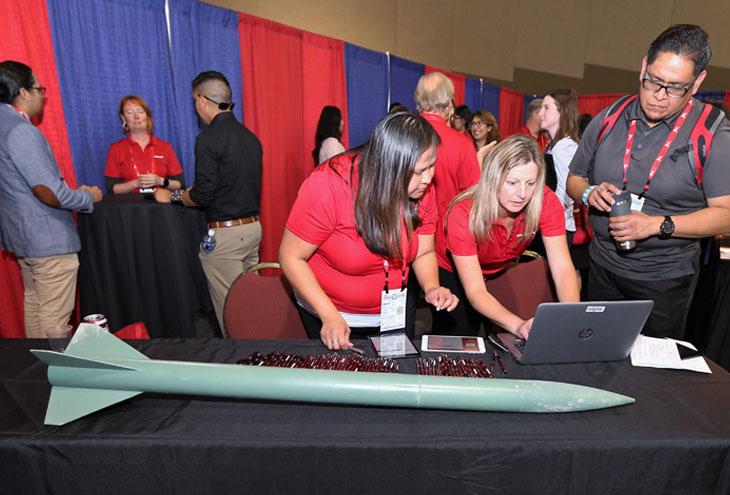You’ve landed a job interview … Now what? Think of it as a mission you have to plan and prepare for, then practice until you’re ready. According to the employment screening company JDP, 70 percent of job applicants practice their interview responses out loud. Taking the time to run through potential answers is one of the best ways to be ready for an interview.
As you prepare, consider that sharing your Native story can enhance the impression you make on an employer. “Perspectives matter,” observes Mandy Smoker Broaddus, a practice expert in Indian education at the nonprofit organization Education Northwest. “Remember that there is a good likelihood that the people interviewing you aren’t aware of your heritage and culture as a Native person.”
First: Interview basics
Let’s start at the beginning. Be sure to thoroughly research the company online, including their social media accounts, to get a sense of the culture and commonly used phrases. Take another look at the job description and make a list of 10 ways your skills and experiences are right for the position. Plan all of the logistics, from what you’ll wear to how you’ll get there (or if it’s a virtual interview, have your technology ready to go). Think through some of the most common interview questions:
• How did you hear about this job?
• Why did you decide to apply?
• How do your education and job experience qualify you for this position?
• What are your longer-term aspirations? (Where do you see yourself in five years … or 10?)
• Do you have any questions for us? (Have one or two that aren’t about salary or benefits.)
Next: How your Native story fits in
In addition to traditional interview questions, you’ll want to prepare for more open-ended inquiries. These are the questions that present the greatest opportunities to talk more about who you are and what you bring to the table. Listen for inquiries like these:
• What are your strengths? Weaknesses?
• Tell us how you handled a difficult situation.
• What’s an accomplishment you’re especially proud of?
• Tell us about an important lesson you’ve learned in recent years.
• How did you handle a setback?
Consider talking about aspects of your life experience that are relevant to the job requirements. “As you are answering questions, try to go back to the values that you have been taught and empowered by — resiliency, courage, loyalty, family, and community,” advises Smoker Broaddus. “You remain committed to those values in all you do, and you will remain committed in the areas of work you are asked to perform.”
Prepare: Find the common ground
Prospective employers want to know about various facets of your life, and that’s a good thing.
After all, it’s best for everyone involved to know if it’s a “match.” You already have your list of the ways your skills and experiences are a fit for the position. Revisit that list and focus on links to your Native story. Find the common ground between what the employer is looking for and the path that brought you here.
Perhaps you have a strength that you attribute to your Native culture. Maybe there’s a capability you’ve tapped into as you’ve dealt with challenges along the way. Or is there a significant lesson you’ve learned that touches on your Native story? You’re the only one who truly understands how your life experience has shaped you as a person and professional. Give it some thought, make notes, and repeat your answers out loud to be sure they really sound like you.
You’ve got this: Pro Tips
• Anxious? You’re not alone. According to JDP, 93 percent of Americans have experienced anxiety related to job interviews. As you prepare, you can boost your confidence and calm any nerves.
• Remember that time is limited. As you hear each question, collect your thoughts. It’s better to reflect for a moment and give a strong one-minute response than risk a three-minute, rambling answer. Aim for 90 seconds or less. If they want to know more, they’ll ask.
• Be you. Practicing is not rehearsing for a role. Your answers will ring true if you use words that come naturally to you. And there’s no need to fill empty pauses with more words. Interviewers may be taking notes and they need time to think too.
• Stay present. Tell yourself you’re ready and take a deep breath (really). Make eye contact, listen carefully, and pay attention to see if this may be the job for you.
 On Topic
On Topic
It is important to an employer that individuals bring their authentic self to work. An employer is not only hiring you based on your degree or experience, they are hiring you for your unique perspective and diversity of thought. Hiring individuals who think and approach situations differently allows for the most innovative solutions for the business. Start by including organizations, activities, and memberships on your resume. This will provide information to the hiring manager about your community outreach and involvement even before you meet for the interview. When preparing for the interview, think about the experiences that you would like to highlight as your greatest accomplishments and remember to practice. It may feel unnatural at first, but an interview is the time when you want to brag about what you have done and what you bring to the table.
As a Native student or professional, you have likely had different experiences than your peers have had. These experiences shape who you are as a person and a professional. Use that to your advantage. The advice or lessons that you have learned from your elders, the ability to listen and respect others, the way that you approach a challenge or your problem-solving capability — experiences like these provide a strong foundation for any professional. Much of what you need to be successful in the workplace are behaviors that you likely already possess. Companies are looking for individuals who are committed to the mission, show up ready to contribute, and think outside the box.
Another key advantage of our culture and sense of community is that Natives already know how to be strong team players — raising the whole team up, not just themselves. Teamwork and relationships allow professionals to build strong networks, which can help you get work done faster and more effectively.
How can interviewees weave their Native story into their answers in an impactful way?
Many companies use behavioral interviewing as part of their candidate selection process. This involves sharing examples of your experience in order to demonstrate how you acted in a given situation. It is important to have several examples to reference prior to the interview, so you are able to respond to the interview questions in a clear and concise way while still addressing the key aspects of the questions. Some examples might be “tell me about a time when you led a project” or “tell me how you went about solving a complex task/problem in a short amount of time.” These types of questions present the perfect opportunity to highlight your accomplishments while also giving insight into your background as a Native professional. Consider including examples of community outreach projects you may have been involved with or led, student or professional organizations that you are a member of and have contributed to. You can even share an example of when you helped support a family member or a friend troubleshoot a problem and arrive at a creative solution.
How can a Native story be relayed without revealing too much personal information?
Be true to yourself. You want the hiring manager to know who you are and why you would be an asset to the organization. If you don’t feel comfortable sharing something, do not feel pressured to do so. Tailor your responses to the questions being asked. It is OK to tell a story, but remember to be deliberate in your responses. A tip that may come in handy is the STAR method — describe the situation, the task that was given, the action that you took, and result that was achieved.
You should also do research on the company or organization before your interview. The company may even have ties to a local tribe, a diverse supplier, or an employee resource group. Having that knowledge will allow you to make a quick connection and present an opportunity to share information about yourself. An example of this is when I was working for Raytheon in the Boston area and was interviewing for a job in Tucson. The business I was interviewing with had a factory in Farmington, N.M., where I grew up, so it was an easy topic to bring up in my interview, allowing me to share a personal story about myself and demonstrate my knowledge of the business.
Be proud of who you are and where you come from. Your unique experiences are what will make you stand out as a candidate and an employee.












